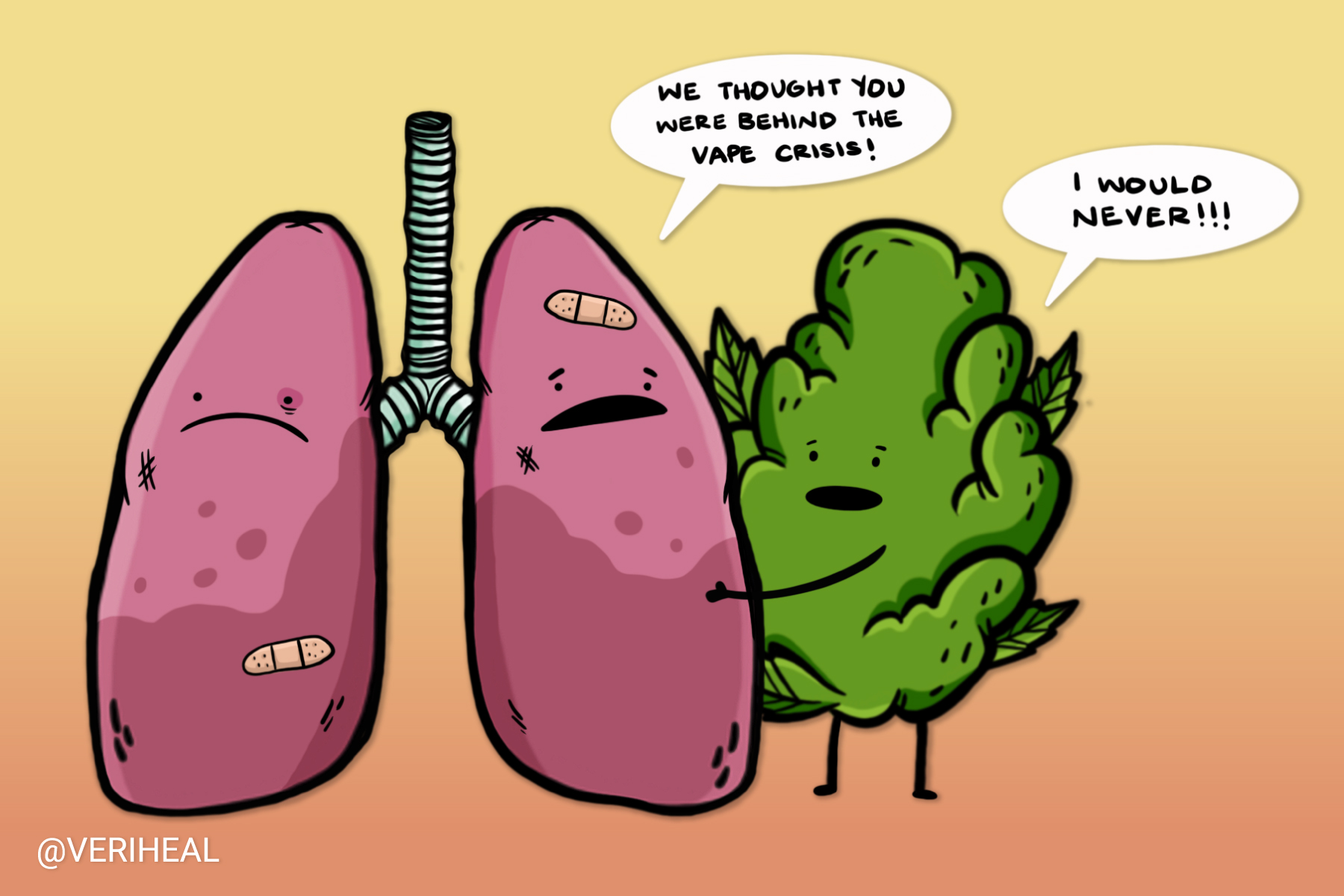Vaporizers such as vaping pens have become popular methods of cannabis consumption, especially since cannabis legalization gained ground over the last couple of years. Shortly before the COVID-19 pandemic hit the globe, America was facing a vaping epidemic they referred to as EVALI, which stands for “E-cigarette or Vaping product use Associated Lung Injury”. There are a lot of rumors about what was responsible for this epidemic. As it turns out, a new study has found that EVALI could be exacerbated by phytol. Phytol is a naturally occurring terpene lauded for its antioxidant properties in products like green tea. But when phytol is used as an additive in vape liquid, research has found it can severely damage the lungs.
A Quick Refresher on EVALI
EVALI was originally called VAPI, which stood for Vaping Associated Pulmonary Illness. However, VAPI soon earned the name EVALI, as growing numbers of severe lung illnesses began to develop. Many believed that ingredients such as propylene glycol or vitamin E acetate were the primary causes of the illness. Both propylene glycol and vitamin E acetate are often used as additives to THC-containing e-cigarettes, but a recently published study suggests that another ingredient, phytol, is substantially more harmful.
Symptoms:
Diagnosing EVALI happens by means of a process of elimination since the symptoms are so similar to many other respiratory diseases. The symptoms associated with EVALI include the following:
- Shortness of breath
- Fever and chills
- Cough
- Vomiting
- Diarrhea
- Headache
- Dizziness
- Rapid heart rate
- Chest Pain
- Opacities (hazy spots on the lungs indicative of tissue damage)
What Does the Study Say About the Cause of EVALI?
Daniela Schwotzer, Andrew Gigliotti, and team published their study in the Inhalation Toxicology: International Forum for Respiratory Research and assessed “phytol, not propylene glycol” as the cause of “severe pulmonary injury after inhalation dosing in Sprague-Dawley rats”. The team explains that additives are put into vaping products to ensure that the product has efficient product delivery, which often includes additives such as phytol and propylene glycol.
Why You Should Get Your Medical Marijuana Card
Veriheal has satisfied millions of patients nationwide by giving them access to these benefits
- Larger purchase limits
- Peace of mind
- Enhanced legal protection
- Access to higher potency strains
- Save up to 25% on cannabis purchases
- Skip the line at the dispensary
Phytol vs Propylene Glycol
The NIH describes phytol as “an acyclic diterpene (chemical) alcohol and a constituent of chlorophyll”. This substance is used as a precursor for creating synthetic forms of vitamin E and vitamin K1. The NIH explains propylene glycol as a “synthetic liquid substance that absorbs water”. The substance is used by chemical, food, and pharmaceutical industries as an antifreeze when there is a possibility of leakage, along with absorbing excess water and keeping certain products moist. Propylene Glycol is also sometimes used to create artificial smoke and was thought to be the cause of EVALI. The team explains that both phytol and propylene glycol are also utilized as thinning agents for vape liquid.
Schwotzer and her team compared phytol and propylene glycol in order to determine their potential toxicity and safety in vaping products. The team made use of male and female Sprague Dawley rats which were exposed to 5mg/L of phytol or propylene glycol. Sprague Dawley rats are a multipurpose breed of albino rats that are primarily used in medical research. While many do not advocate for using animals for testing, these rats are selected for their notoriously calm demeanor and because they are also easy to handle.
The Study Finds That Phytol is Extremely Harmful
Through exposing the rats to one (phytol) or the other (propylene glycol), the team was able to assess whether any clinical signs were expressed. They found that the rats which were exposed to phytol, “expressed severe clinical signs, bodyweight loss, and mortality” after one to two days of exposure. Additionally, they found that the same rats suffered from “dose-responsive tissue degeneration (or decline), necrosis (death of body tissue), edema (swelling), hemorrhage (bleeding), and inflammation (the fight against the harmful and foreign”. Meanwhile, the rats which were exposed to high levels of propylene glycol did not present with any adverse reactions to the substance, not even after 14 days of exposure to the high dosage.
The team concluded by explaining that they do not recommend using vaping products which contain phytol since it has proven to develop adverse effects, while still not having a NOAEL, or No Observed Adverse Effect Level. However, propylene glycol has been established as safe with an established NOAEL at “1151.7/115.2 mg/kg/day presented/deposited dose in rats”.
It appears as though the EVALI epidemic disappeared as quickly as the Covid-19 pandemic appeared and the overlapping emergence of both situations blur together causing widespread speculation. A resurgence of EVALI can be devastating, however, one has to wonder why America was the only country that seemed to be affected by EVALI. As we reported previously, vaping is popular in the UK but they never reported having any EVALI cases, which America was struggling with. Perhaps by understanding the true causes of EVALI, one being phytol, we can begin to understand why America suffered through the EVALI epidemic in the first place, as well as how to prevent a resurgence.
Author, Share & Comments
















